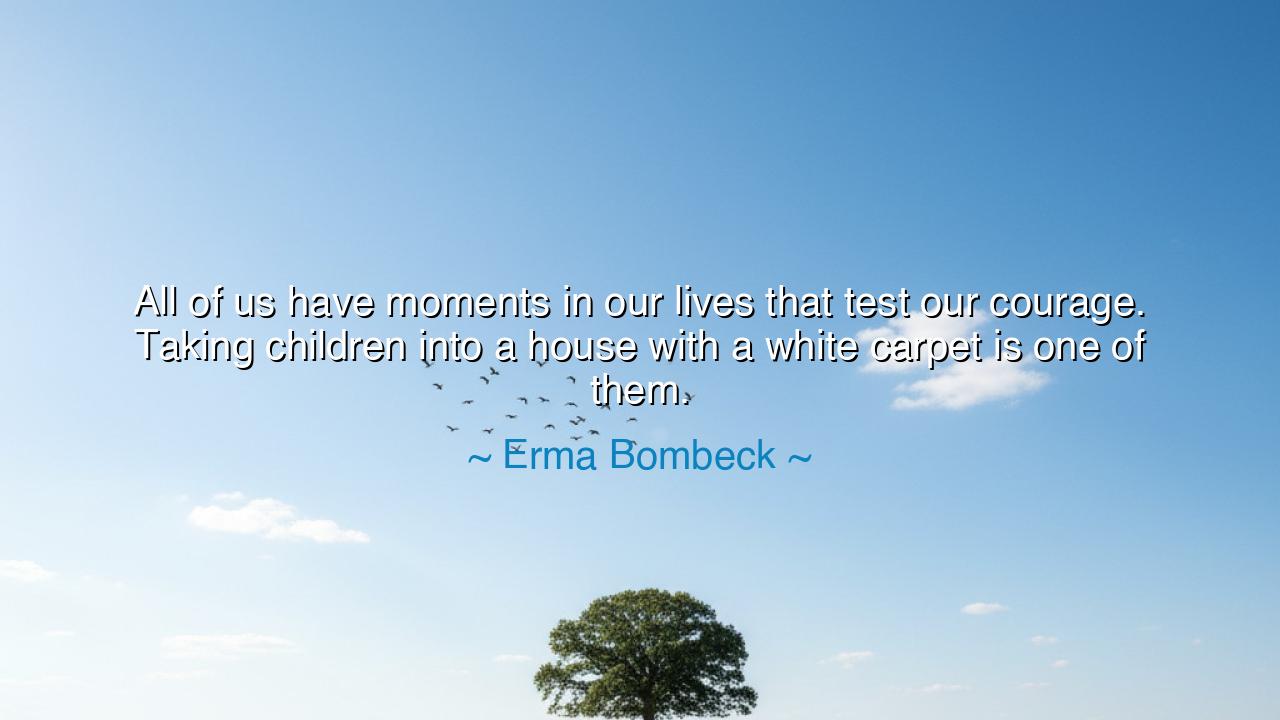
All of us have moments in our lives that test our courage. Taking
All of us have moments in our lives that test our courage. Taking children into a house with a white carpet is one of them.






“All of us have moments in our lives that test our courage. Taking children into a house with a white carpet is one of them.” Thus spoke Erma Bombeck, the humorist and philosopher of ordinary life, whose pen transformed the chaos of family living into wisdom laced with laughter. Though light in tone, her words carry the depth of truth that only those who have lived through the trials of daily existence can understand. In this playful jest about children and a pristine carpet, she unveils a profound truth about courage—that it is not always found on the battlefield or in the council of kings, but in the quiet, relentless patience of everyday love.
To understand Bombeck’s meaning, we must first see the heart beneath her humor. She was a woman who wrote not from theory, but from the living pulse of family life—the spilled juice, the midnight worries, the laughter that rescues exhaustion. When she speaks of “a house with a white carpet,” she is not merely describing an interior decoration; she is painting a symbol of perfection, of the human longing for order and control. And when she places children—symbols of innocence, unpredictability, and joyous chaos—within that fragile perfection, she reveals the timeless struggle between life as we imagine it and life as it truly is.
Her jest is therefore an allegory. The white carpet represents all that we strive to keep spotless: our plans, our pride, our ideals. But life, like children, is messy, spontaneous, and uncontrollable. It tests our patience, humility, and humor. Bombeck’s words remind us that courage is not only the strength to face danger, but the grace to endure imperfection. The mother who laughs instead of weeping when grape juice stains the rug has achieved a victory more noble than many warriors. She has chosen love over perfection, joy over despair, humanity over control.
Consider the story of Corrie ten Boom, who during the horrors of the Second World War sheltered the persecuted in her home. Her days were filled with danger, her nights with fear. Yet when peace finally came, she wrote not of vengeance or bitterness, but of forgiveness and grace. Her courage was not loud—it was steady, humble, enduring. Like Bombeck’s homemaker, she faced the uncontrollable with faith and gentleness. Both women understood the same truth: that the test of courage is not always in grand deeds, but in the heart’s quiet strength to love and endure amid uncertainty.
Erma Bombeck, with her humor, teaches us what philosophers have long proclaimed in solemn tones—that happiness is not found in the pursuit of perfection, but in the acceptance of life’s imperfection. The white carpet will stain; the house will grow noisy and disordered; time will wrinkle every surface, including our faces. Yet in these changes lies the true texture of living. To demand purity and control is to live in fear; to embrace the unpredictable is to live in freedom. Her quote, though comic, contains this profound wisdom: that the courage of the heart is not only to fight life’s chaos, but to dance within it.
In this way, Bombeck transforms the mundane into the magnificent. She shows us that courage can dwell in the laughter that follows disaster, in the patience that soothes a crying child, in the willingness to let go of what cannot be kept perfect. Life’s greatest tests often come not from the grand events, but from the small daily choices that shape the soul. To welcome joy, even at the cost of order, is to choose love over fear.
Therefore, let this be the lesson passed down to all who seek to live wisely: do not fear the stains of life. Let the children play. Let the carpet bear its scars, as your heart bears its memories. Choose laughter when you can, forgiveness when you must, and gentleness always. For it is in these small acts of grace that true courage reveals itself. As Erma Bombeck teaches, life will test us again and again—not with dragons or wars, but with spilled milk, broken plans, and unexpected moments of love. Meet them not with anger, but with courage—the quiet courage that smiles, endures, and finds beauty even in the mess.






AAdministratorAdministrator
Welcome, honored guests. Please leave a comment, we will respond soon